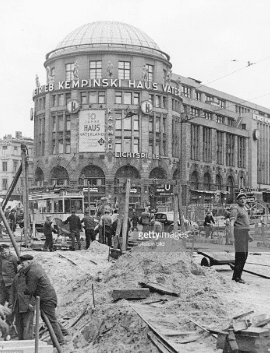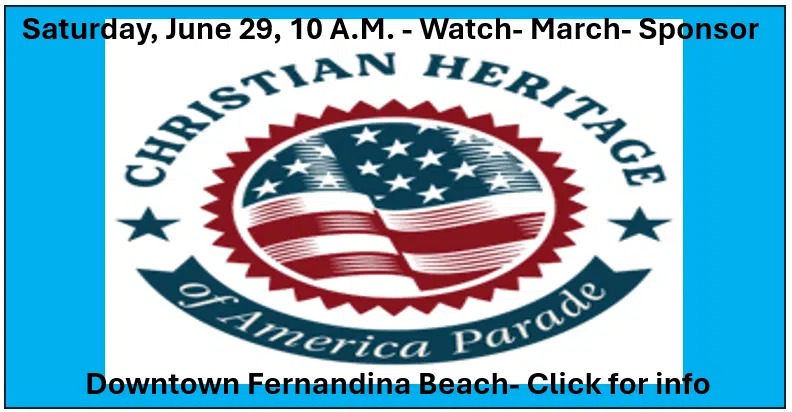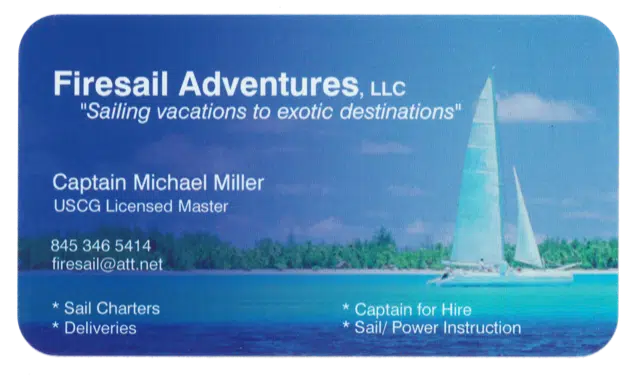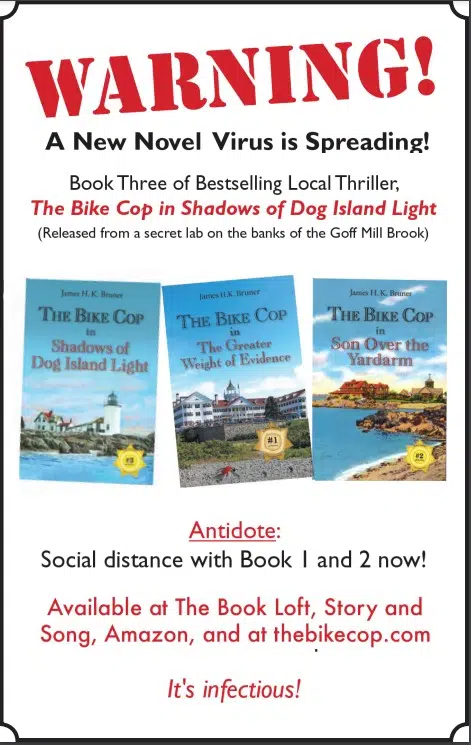Feature
By Karen Siegemund
05-06-24
Born in 1928 in Berlin, my dad had been conscripted, with his entire high-school class, as a “Luftwaffenhelfer,” supporting the Luftwaffe at an anti-aircraft installation outside the city. But in the final days of the war, he found himself in Berlin. The following is an excerpt from his memoirs, As I Remember It, published in 2021. The book can be found here. This is Part 2 of the account.
Before the water reached the subway station, my companion and I and some others emerged from our tunnel existence with no clue what to expect. And what a sight it was. The station opened up onto the Pariser Plaza, near the Swiss embassy. The Brandenburg Gate was still standing, a monumental sight, but to some extent, typical, frugal Prussian and not too imaginative architecture. There was a red flag flying from the top, but it wasn’t the famous (staged) picture of the red flag over the Reichstag, the partially burned out Parliament. The Brandenburg Gate was, of course, damaged but hadn’t collapsed (that is where I got my first inkling on the inefficiency of Russian artillery). There was some smoke, but no fire (there was little left to burn); and the noise of the artillery barrage of past days had given way to a cacophony of oriental proportions. Cars, trucks, tanks, armored vehicles, horse-driven wagons, motorcycles, soldiers marching, walking, standing in groups talking, almost like a sightseeing scene (and to some of them, it probably was), right in the middle of the former seat of power from which the devastation of a great part of their country had originated. Having been used to the crispness and uniformity in the German military, including the Nordic look, I was immediately fascinated by the variety of uniform and attire that passed as uniform, but even more fascinating was the ethnic and racial variety. Slavic faces, of course, dominated, but then there was the enormous variety of oriental – Mongol, Central Asian, etc. etc. – people. In the middle of it, several very resolute-looking female soldiers directed traffic in the typical chaotic fashion such a scene almost inevitably invites. But no matter what chaos there was–it was very obvious–they had won, Berlin was conquered and it was all over.
I remember being fascinated to the point of forgetting that, with impunity, any of them could have taken a gun and shot at us, for target practice or no reason at all. But reality soon overtook us. My companion and I, and possibly a few others, blended as much as we could into the background–meaning the rubble alongside buildings and what was left of them–and gradually we walked away from downtown.
However, very soon, we were captured by some patrol. There were other civilians like us of dubious status, but there were also obviously genuine ones, as one could see from their clothing.
We were all herded towards the downtown airport which served as the principle gathering / collecting point for German soldiers from the Berlin war theater. This didn’t look very promising, but I’d declared myself a civilian. I was still a kid and carried no paraphernalia that proved otherwise. My companion and others were in the same boat, and that helped to keep up morale. That may have meant nothing to the Russians but what did I care. After a while, we were marched out of Tempelhof airfield, but we civilians were kept together–a promising sign. It was a slow process; the streets were lined with people in various stages of shock.
So, we marched and marched along city streets in an easterly direction. As evening came, we civilians were separated from the rest, again a hopeful sign (how selfish one becomes in such circumstances), and we were led to a camp with foreign workers–I think they were Dutch, waiting to be transported home. They had obviously not been badly treated by the German authorities; they didn’t look famished. In fact, I remember that they looked quite well-fed; and to their everlasting honor, they didn’t feel or act vengeful towards us German civilians. After all, it would have been an opportunity for them to let these damn Germans have it.
Well, they didn’t. In fact, they even gave us something to eat, and we even slept a little.
In the morning of May 3rd about 20 or so of us were led out and walked back again – that is, toward the west, while the rest continued towards the east. Another hopeful sign.
We were led to a Rathaus –town-hall–that had become a Russian “commandantura.” It was the local town hall of Köpenik, a southeastern district of Berlin. The district and the town hall had become famous for the incident of the so-called Captain of Köpenik. He was a shoemaker who, as the story goes, got a hold of the Prussian Captain’s uniform, and then, duly attired and solely on the strength of the uniform, he had recruited some soldiers and impounded whatever cash was in the town hall. He gave the money back; he just wanted to demonstrate how easy it was, in imperial Prussia, to make people obey orders just on the “strength” of the uniform. The German playwright, K. Zuckmeyer, wrote a wonderful play about this 1906 incident which was made into a movie a few years later. At that point, I didn’t know that, but it’s curious that, in a way, there was a kind of repetition. Most of us “civilians” were civilians just on the strength of our attire! Would that fool the Russians, as it had the Prussians half a century earlier?
We were left outside to wait. I believe whoever was in charge in the Rathaus couldn’t care less. Maybe he enjoyed the appurtenances of a neat German office. Well, whatever his motivations were, we 20 or so were soon told to go home. So, we all split and my companion and I separated. I think he gave me his name and address, and I gave him mine, but I lost it and never heard from him again. I hope he made it though his route home may have led him, again, dangerously close to downtown; my route was west and way to the south of downtown. As I soon observed, that part of the city had been conquered a little while before.
And so on May 3rd, I started to walk home from the southeastern part of the city.
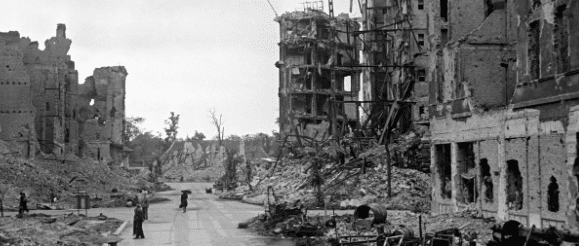
It was almost spooky, because that part of the city hadn’t seen much damage–hardly any bomb damage and not much artillery damage, either. It had been occupied by the Russians quite rapidly, with little fighting; otherwise, there would have been more visible damage. Apparently, the Russians hadn’t used their artillery to aid the advance of their troops–a pattern I found repeated elsewhere, which suggests an interesting side issue. The West uses artillery and aircraft bombing to demolish enemy defense lines so that ground soldiers will encounter little resistance and keep your own losses low. The Russians didn’t care in the slightest, and dictators generally have other priorities. Soldiers are expendable commodities; artillery is a demonstration of power. The ridiculous artillery bombardment of downtown Berlin served no military purpose whatever; Hitler was deep down somewhere and couldn’t have cared less about people being hurt up on the surface.
As I began my long walk home–40 kilometers or thereabouts–two episodes stand out. In one of the districts on the outskirts, actually not far from Köpenik, I got thirsty, and believe it or not, there was a pub with customers drinking beer, an almost unbelievably peaceful scenario. That district, however, had in the past been heavily Communist; the talk of the people in the pub I overheard sounded like a subdued victory party. I must have had money to pay for my beer. For them, apparently, the war was over. At that point, though, it hadn’t sunk in for me.As I walked on, I became increasingly exhausted and wondered whether I would make it home that day, so decided to walk towards the house of friends of the family, the Ides. As I started to walk in that direction I passed what would become a historic site, the town hall–Rathaus–of Schöneberg. In a few years’ time, it would become the City Hall of West Berlin. President Kennedy delivered his famous “Ich bin ein Berliner” speech from that building’s front steps. I was lucky enough to find the house fairly quickly but upon getting there, I found that the Russians had burned the house down. But I was able to locate them.
Now, I want to dwell on this a bit, because from the point of emotions–despair, hope, exuberance–my discovering them was the first event like this, that would repeat itself in coming weeks and months, fortunately quite often, and which controlled many peoples’ emotion to a great extent. The war was over, you’d survived, and now you find friends who, too, had made it. But not necessarily just friends; other people who had been a part of your life, or, in some cases, even those you just knew and with whom you had lost contact for quite some time, or even people you didn’t like who surfaced, and to find them alive is one of my most precious memories of the entire period. Never mind the rubble and the non-functioning technical civilization. How I found Lotte and Walter Ide, I don’t recall. Lotte told me afterwards that they’d been busy getting corpses out from under rubble, and that I’d actually helped. Well, I don’t recall; they just took me to their current shelter/place of abode and put me to bed. It was May 3rd in the afternoon, and I slept for about 30-plus hours; the entirety of May 4th is unaccounted for. On May 5th, I finally went home. All this may sound crazy and confusing, but it wasn’t. It was an attempt, on a day-by-day basis, sometimes on an hour-by-hour basis, to cope with confusion–and it worked, to some extent at least. In any event, in the afternoon of May 5, I was home again, really and for good.
You can read his whole book here.
From the Balcony is a reader-supported publication.
| © 2024 Karen W Siegemund Calabasas, CA Karen Siegmund, PhD, is President of the American Freedom Alliance, a former teacher and prior to that, worked as a developer for U.S. Navy sonar systems. More info HERE |
Link to Substack App: Introducing the Substack app


